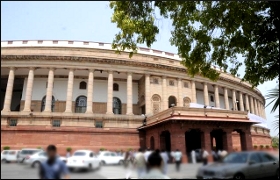|

|
Land Acquisition Bill passed in Lok Sabha
|
|

|
|
| Top Stories |
 |
|
|
|
SME Times News Bureau | 30 Aug, 2013
The Lok Sabha Thursday passed the much-awaited land acquisition and rehabilitation bill that aims to provide fair compensation to those whose land is taken away, brings transparency to the process of acquisition of land to set up factories or buildings and assures rehabilitation of those affected. This legislation has been eagerly sought by both industry and those who live off the land.
Out of the 235 members who voted on the bill, 216 backed it while 19 voted against it. The bill aims to replace a nearly 120-year-old law enacted during British rule in 1894.
While the Congress termed it a historic step, most parties supported it but said fertile land should not be acquired for industrial development. Instead, barren land should be used for the purpose, they said.
"It is a historic step. For the first time it brings transparency in the process of land acquisition, compensation and rehabilitation as a matter of right," Congress member Meenakshi Natrajan said while participating in the debate on the land takeover bill.
"This (the bill) is a middle path we have found. Groups were demanding separate things. It is wrong to say I have not consulted them," Rural Development Minister Jairam Ramesh said.
Ramesh said industrial houses, political parties and civil society have also been consulted.
Bharatiya Janata Party chief Rajnath Singh said: "Under no circumstances should you acquire irrigated land and agricultural land. You should make do with wasteland,"
Parties like Communist Party India-Marxist (CPI-M), Communist Party of India, Trinamool Congress, Janata Dal-United (JD-U), Biju Janata Dal, Rashtriya Janata Dal, Samajwadi Party and Bahujan Samaj Party also said that the consent of the farmer was key in any land acquisition and suggested that fair compensation should be paid to him while demanding special economic zones to be included in the law.
"Don't acquire fertile land. Instead use waste land to develop industry," Samajwadi Party chief Mulayam Singh Yadav said.
Terming the bill, which will be now called The Right to Fair Compensation and Transparency in Land Acquisition, Rehabilitation and Resettlement Bill, 2012, as anti-farmer, Bahujan Samaj Party member S.S. Nagar said: "Change of land use is controversial point."
Noting "the SEZ was a big scam," JD-U leader Rajeev Ranjan said: "It is a tooth less bill. The fertile land should not be acquired."
Trinamool Congress member Sudip Bandyopadhyay said the earlier "draconian" law was applied on farmers of Nandigram and Singur and "how they fought under the leadership of Mamata Banerjee is history".
"There was no forced acquisition in Singur and Nandigram. Not a single inch of land was acquired in Nandigram. There is a difference between announcement and acquiring," CPI-M member Basudeb Acharia said, countering the TMC charge.
While the government moved 165 amendments, the opposition moved as many as 116 amendments to the bill.
A key feature of the bill is that the consent of 80 percent of land owners concerned is needed for acquiring land for private projects and of 70 percent landowners for public-private projects.
The bill also defines "public purpose" to include: mining, infrastructure, defence, manufacturing zones, roads, railways, highways, and ports built by government and public sector enterprises, land for project-affected people, planned development and improvement of village or urban sites and residential purposes for the poor and landless and government-administered schemes or institutions, among others.
The bill seeks to address problems of industry regarding acquisition of land for setting up projects, and provides for rehabilitation and resettlement of displaced people.
It has provisions like compensation for the owners of the acquired land to be four times the market value in case of rural areas and twice in case of urban areas.
Introduced in 2011, the bill was scrutinised by parliamentary panel that submitted its report in May 2012.
|
|
|
| |
|
|
|
|
|
|
|
|
|
|
|
|
|
|
| |
| Customs Exchange Rates |
| Currency |
Import |
Export |
US Dollar
|
₹91.25
|
₹89.55 |
UK Pound
|
₹122.85
|
₹118.85 |
Euro
|
₹107.95
|
₹104.3 |
| Japanese
Yen |
₹59 |
₹57.1 |
| As on 29 Dec, 2025 |
|
|
| Daily Poll |
 |
 |
| What is your biggest hurdle to scaling right now? |
|
|
|
|
|
| Commented Stories |
 |
|
|
|
|
|
| |
|